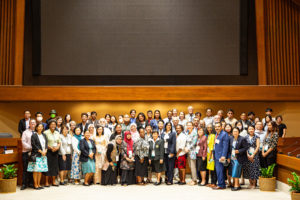Information for Development: Libraries and UN Experts Engage in Bangkok
05 فبراير 2024
Access to information is often taken for granted, but represents a key condition for achieving innovation and positive change. At a seminar at the UN Economic and Social Commission for Asia-Pacific in Bangkok, around 50 libraries explored opportunities for stronger engagement in development initiatives.
IFLA’s work around the Sustainable Development Goals centres on the recognition, in the 2030 Agenda, that access to information is a goal that needs to be pursued as part of any broader development effort.
Through their work from day to day, libraries provide access to information, as well as the skills and encouragement to use it, in order to fulfil rights and realise potential. This is as true at the level of individuals as it is within governments and international organisations.
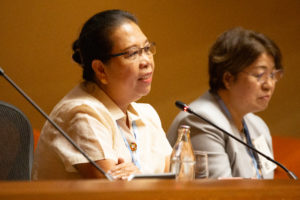
However, the potential to make libraries part of development initiatives and plans is all too often overlooked, with projects taking place in parallel but not in coordination.
This is as much an issue for libraries themselves as it is for major development actors. Libraries need to listen to the questions that policy-makers are asking, and provide answers clearly and effectively. Development actors need to update their perception of libraries.
This was the goal of a seminar held at the United Nations Economic and Social Commission for Asia-Pacific (UN ESCAP) in Bangkok on 15 November. Around 50 librarians from across the Asia-Oceania region came to the UN, ready to share their practical experiences of delivering success in a range of areas on which UN ESCAP itself is also working.
We are very grateful, in turn, to the UN ESCAP experts who shared insights into their work and priorities.
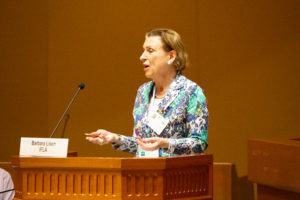
The event opened with a welcome from Chief of Communications and Knowledge Management, Mitch Hsieh, and IFLA President Barbara Lison.
A first session featured Oliver Paddison, Countries with Special Needs Section, who provided an overview of work around the Sustainable Development Goals, highlighting both the major acceleration in efforts that will be needed to achieve them, and the pressing need for better data and evidence. Claire Thorpe (Australia) and Premila Gamage (Sri Lanka) then highlighted their work in engaging with the SDGs.
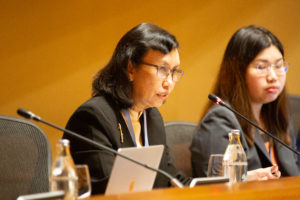
Jonathan Tsuen Yip Wong, Chief of Technology and Innovation, highlighted the potential of extending internet access and supporting its use in generating new business models and opportunities in order to support development at all levels. The examples he provided tallied closely with activities that libraries are already carrying out of course, with Elvira Lapuz (Philippines) and Misako Nomura (Japan) providing powerful case studies.
The second half of the seminar was given over to the work of UNESCO, with Sowirin Chuanprapun and Papol Dhutikriakriang from UNESCO Bangkok talking about key regional initiatives to promote school attendance and engagement, and to ensure greater equity in particular. They highlighted the importance of libraries in ensuring that children could access relevant content. Myat Sann Nyein (Myanmar) and Labibah Zain (Indonesia) in turn talked about practical work libraries are undertaking to support learning throughout life.
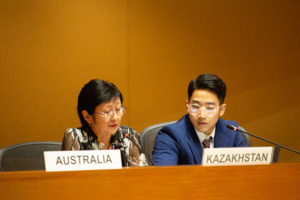 Finally, Montira Horayangira Unakul, Culture Programme Office at UNESCO Bangkok highlighted work on culture and heritage in the region, and in particular set out efforts to build stronger understanding of the connections between culture and sustainable development. Tania Riviere (Australia) and Botakoz Sarsenbayeva (Kazahkhstan) talked about the work of their IFLA Preservation and Conservation Centres in ensuring that heritage is accessible, now and in the future.
Finally, Montira Horayangira Unakul, Culture Programme Office at UNESCO Bangkok highlighted work on culture and heritage in the region, and in particular set out efforts to build stronger understanding of the connections between culture and sustainable development. Tania Riviere (Australia) and Botakoz Sarsenbayeva (Kazahkhstan) talked about the work of their IFLA Preservation and Conservation Centres in ensuring that heritage is accessible, now and in the future.
The seminar proved very useful for all involved, with UN experts coming away with a range of insights into the potential to cooperate with libraries in order to achieve successes across the board, and libraries themselves seeing concretely how work with the UN can help them deliver on their missions.
In addition to following up at the regional level, library participants will be looking to contact national UN representations in their countries in order to take partnership further.
We are very grateful to Carly Wood Bachman, the head of the UN Library in Bangkok, for her amazing support in making this seminar happen, and look forward to working more with her and colleagues in the region to ensure that we realise the potential of access to information to drive inclusive sustainable development.
Watch the seminar on IFLA’s YouTube channel.
